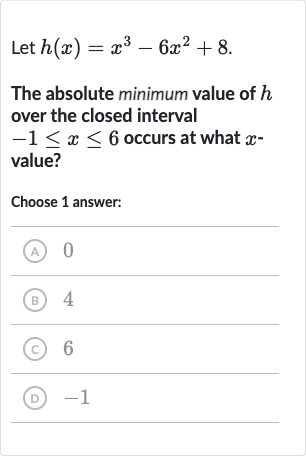Full solution
Q. Let .The absolute minimum value of over the closed interval occurs at what value?Choose answer:(A) (B) (C) (D)
- Find Derivative of h(x): To find the absolute minimum value of the function over the closed interval , we need to find the critical points of within the interval and evaluate at the endpoints of the interval. Critical points occur where the derivative is zero or undefined.Let's find the derivative of . =
- Find Critical Points: Now we need to find the values of where . Setting to zero gives us: This gives us two solutions: and .
- Evaluate at Critical Points and Endpoints: We need to check if these critical points are within the interval . Both and are within the interval, so we will evaluate at , , and at the endpoints and .
- Evaluate at : Let's evaluate at :
- Evaluate at : Now let's evaluate at :
- Evaluate at : Next, let's evaluate at :
- Evaluate at : Finally, let's evaluate at :
- Compare Values and Determine Absolute Minimum: Comparing the values of at , , , and , we find that the smallest value is . Therefore, the absolute minimum value of over the interval occurs at .
More problems from Euler's method
QuestionGet tutor help
QuestionGet tutor help
QuestionGet tutor help
QuestionGet tutor help
QuestionGet tutor help
QuestionGet tutor help
QuestionGet tutor help
QuestionGet tutor help
QuestionGet tutor help

